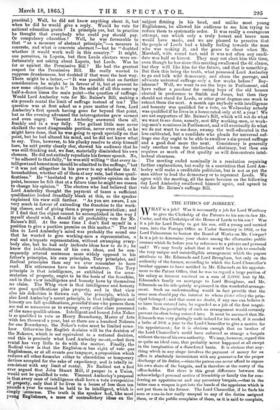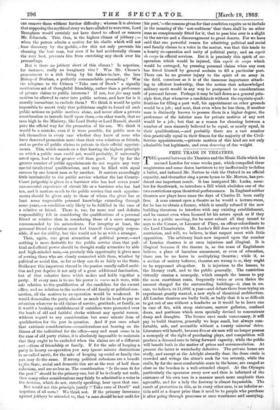THE ETHICS OF JOBBERY.
WHAT is a job? Was it necessarily a job for Lord Westbury to give the Clerkship of the Patents to his son-in-law Mr. Caner, and the Clerkships of the House of Lords to his son? Was it a job for Lord Derby to get his son, still a young and untried man, into the Foreign Office as Under Secretary in 1852, or for Lord Palmerston to bestow the Board of Works on Mr. Cowper? Is it a job to determine your choice among the alternative public courses which lie before you by reference to a private and personal end? We may freely admit that it would be a job to conclude the very unique and unintelligible arrangement which the papers attribute to Mr. Edmunds and Lord Brougham, but only on the authority of the former, according to which the Lord Chancellor's brother appears to have notified to Mr. Edmunds on his appoint- ment to the Patent Office, that he was to regard a large portion of his salary as interest received on a sum of 5,000/. lent by Mr. Edmunds's family on mortgage to Lord Brougham, and Mr. Edmunds on his side quietly acquiesced in this wonderful arrange- ment. Such an understanding would in fact provide that the same man should pay the interest to whom (inter alios) the prin- cipal belonged ; and that must no doubt, if any one can believe it to have been entered into, be regarded as a job of the first magni- tude. But the peculiarity of such an arrangement would certainly prevent its often being entered into. It must be assumed that Mr. Edmunds was very glaringly unfit indeed for his work, if it needed a bribe of 300/. a year to the Lord Chancellor to give a motive for his appointment ; for it is obvious enough that no brother of the Lord Chancellor's could have enforced so strange a bargain without the use of his own authority. We may, however, regard this as quite an ideal case, that probably never happened at all except in the imagination of a disiarclered brain. It is obvious that any- thing which in any shape involves the payment of money for an office is absolutely inconsistent with any guarantee for the proper discharge of its duties,—since the patron can never afford to expose his own share of the bargain, and is therefore at the mercy of the office-holder. But there is this great difference between the acknowledged personal motive of friendship or family ties for con- ferring an appointment and any pecuniary bargain,—that in the latter case a weapon is put into the hands of the appointee which is not put there in the former. The Lord Chancellor, if he finds his sons or sans-in-law really unequal to any of the duties assigned them, or if the public complains of them, as it is said to complain, can remoee- them withbut further difficulty ; whereas ft is obvious that supposing the mythical story we have alluded to were true, Lord Broughitili would certainly nob have dared to offend or remove Mr. Edmunds. This; then, is the highest climax of ' jobbery ; — when the patron admits a motive for his choi8e which will not . hear discovery by the 'public, —for this not only prevents his choosing the best man, but even if he had accidentally chosen the ,very best, prevents him from exercising- any check over his proceedings.
- But is there no jobbery short of this climax? Is nepotism, for instance, really an imaginary vice ? Was Mr. Cheese's presentment to a rich living by his father-in-law, the late Bishop of Durham, a perfectly commendable proceeding.? Was the telegram to the Crimea "Take care of Dowb " a signally meritorious act of thoughtful friendship, rather than a preference of private claims to public interests ? If not, how far may such motives be allowed to enter into public actions, and how far is it morally incumbent to exclude them ? We think it would be quite Impossible to assert truly that politicians ought to found all such public actions on public motives alone, and never allow a private consideration to intrude itself upon them,—in other words, that no Man high in the Ministry, like Lord Derby or Lord Russell, should pave the official way for the promotion of his son. We think it would be a mistake, even if it were possible, for public men to ask themselves in every case whether they know of none who have deserved promotion more than their own relatives or friends, and so prefer all public claims to private in their official appoint- ments. This, which sounds on a first hearing the highest principle on which a public man could act, would probably, if universally Listed upon, lead to far greater evil than good. For by far the greater number of public appointments do not require any very special intellectual qualifications, and may be filled with equal success by one honest man as by another. It matters exceedingly tittle intrinsically to the public service whether the last County- Court judgeship is given to a barrister who has had seven years' unsuccessful experience of circuit life or a barrister who has had ten, and it matters much to the public service that such appoint- ments should be given only to those of whom the giver has at least some respectable personal knowledge extending through some years,—a condition only likely to be fulfilled in the case of a relative or friend. There is, too, far more real and definite responsibility felt in considering the qualifications of a personal friend or relative than in considering those of a mere stranger recommended by his antecedents. For integrity at least, the personal friend or relation must feel himself thoroughly respon- sible, if not for ability, but this would not be so with a stranger.
Then, again, one great attraction of political power,—and nothing is more desirable for the public service than that poli- tical and official power should be thought really attractive by able and high-minded men,—is precisely this opportunity it gives men of serving those who are closely connected with them, whether by political or social ties, so far as they can do so fairly to the State. Strike out this important thread in the passion usually called ambi- tion and you deprive it not only of a great additional fascination, but of that cohesive force which makes and holds together a party. If every man is to use his power in vacuo as it were, with Sole relation to the qualification of the candidate for the vacant office, and no relation to the motives of old family or political con- nection, all the motives to co-operation would be weakened. It would demoralize the party almost as much for its head to pay no attention whatever to old claims of service, gratitude, or family, as it would a banking establishment if outsiders were promoted over the heads of old and faithful clerks without any special reason, without regard to any consideration but some minute item of qualification for the post in question. And if you once admit that extrinsic considerations—considerations not bearing on the fitness of the individual for the office—may and must come in in the case of old party claims, it is absolutely impossible to maintain that they ought to be excluded when the claims are of a different sort—those of friendship or family. If for the sake of keeping a party in heasty co-operation you may ignore minute distinctions in so-called•Merit, for the sake of keeping up social or family ties you may do the same. If strong political cohesions are a benefit to.the State, social and domestic ties are at the root of half these cohesions, and areno less so. The consideration "Is the man fit for the post ?" should be the primary one, but if he is clearly not unfit, then many other considerations may fairly be admitted to a voice in the decision, which do not, strictly speaking, bear upon that one.
But would not this principle justify "Take care of Dowb" and nepotism of all sorts? We think not. If the primary insurance against jobbery be attended to, that 'a man should be not unfit for
his post,'—the reasons given for that condition require us to include in the meaning of the 'not-unfitness' that there shall be no other man so conspicuously fitted for it, that to pass him over is a slight to the service and a discouragement to great deserts. For we have said that one powerful reason for admitting political and social and family claims to a voice in the matter, was that this tends to a hearty co-operation and unity of political party, and an esprit de corps in official services. But it is precisely this spirit of co- operation which would be injured, this esprit de corps which would be outraged, by pressing -personal claims when any man has fitted himself by general acclaim to fill a particular post. There can be no greater injury, to the spirit of an army in the field, conscious as it is of the immense importance attach- ing, to efficient leadership, than the notion that acknowledged military Merit would in any way be postponed to considerations of personal favour. Perhaps it may be laid down as a general prin- ciple first, that whenever a candidateis without the requisite quali- fications for filling a post well, his appointment on other grounds would be a job ; and next, that even -when he has them, if another man is distinctly known to possess them in a higher degree, the preference of the inferior man for private motives of any sort would be a job ; but that as a reason for choosing between a number of men sincerely believed 'to be equal, or nearly equal, in their qualifications,—and probably there are a vast number thus practically equal in their fitness for the majority of the Civil- Service appointments,—private motives of this kind are not only admissible but legitimate, and even deserving of due weight.































 Previous page
Previous page